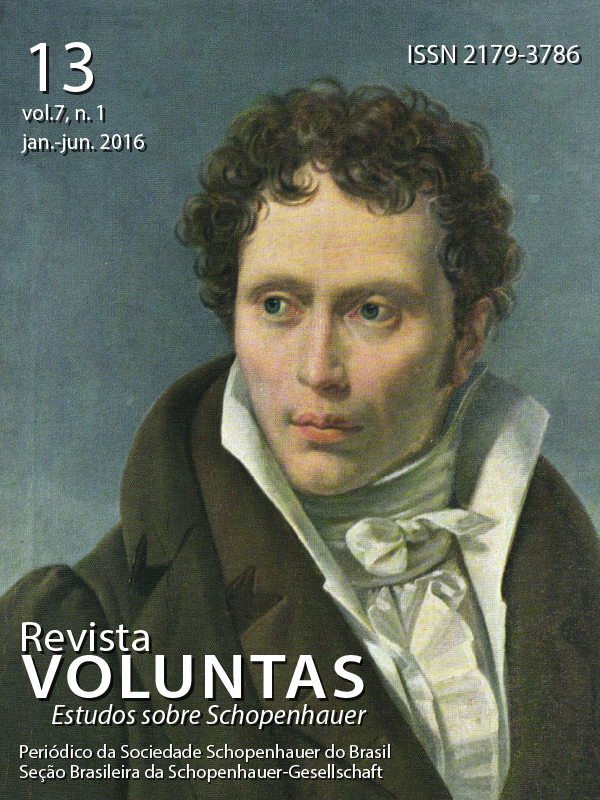The metaphysics of conflict: some reflections on Schopenhauer’s politics
DOI:
https://doi.org/10.5902/2179378633761Schlagworte:
Schopenhauer, Metaphisics, Conflict, Political manichaeismAbstract
This paper argues for a new interpretation of Schopenhauer’s political theory in the light of the category of conflict. According to Schopenhauer’s metaphysics, The Will (to live), that inhabits any living being and always requests Will/life, cannot ever grasp itself in the “representational” side. This generates struggle, conflict, misery and sorrow. This schismatic and conflictual schema recurs in his moral, social and political arguments. Coherently with his meta-physical view, he substantially theorized the socio-political issue twofold (“political Manichaeism”). On the one hand is the representational sphere - politics as an institutional question (the regulative function of the State); on the other hand, the metaphy-sical or inner sphere - conflict (as means) is unavoidable and solidarity (as goal) in any human social, moral and political agency represents the one and only irremissible prescriptive principle.Downloads
Literaturhinweise
BAHNSEN, Julius. Das Tragische als Weltgesetz und der Humor als ästhetische Gestalt des Metaphysischen. Lauenburg, 1877; now in Das Tragische als Weltgesetz und der Humor als ästhetische Gestalt des Metaphysischen. hrsg. von W.Müller-Seyfarth. Berlin: VanBremen
VerlagsBuchhandlung, 1995.
BAHNSEN, Julius. Der Widerpruch im Wissen und Wesen der Welt. Princip und Einzelbewährung der Realdialektik, 2 vol. Leipzig, 1882.
BARBERA, Sandro. Une philosophie du conflit. Études sur Schopenhauer. Paris: PUF, 2004.
BRINKMANN, Karl. Die Rechts- und Staatslehre Schopenhauers. Bonn: E. van Hippel, 1958.
FAZIO, Domenico M. La Scuola di Schopenhauer: testi e contesti. Lecce: Pensa MultiMedia, 2009a («Schopenhaueriana», 2).
FAZIO, Domenico M. Die “Schopenhauer-Schule”. Zur Geschichte eines Begriffs. In: Schopenhauer und die Schopenhauer-Schule. Beiträge zur Philosophie Schopenhauers. hrsg. von D. Fazio, M. Koßler, F. Ciracì. Würzburg: Königshausen & Neumann, 2009b, pp. 15-41.
GODART-VAN DER KROON, Annette. Schopenhauer's Theory of Justice and its Implication to Natural Law. Jahrbuch der Schopenhauer-Gesellschaft, vol. 84, 2003, pp. 121-146.
HABERMAS, Jürgen. “The Political”. The rational meaning of a questionable inheritance of political Theology, in The Power of Religion in the public Sphere. ed. by J. Butler, J. Habermas et al. New York: Columbia University Press, 2011, pp. 15-33.
HONNETH, Axel. The struggle for recognition. The moral grammar of social conflicts. Cambridge/London: MIT Press, 1996.
HORKHEIMER, Max. Gesellschaft im Übergang: Aufsätze, Reden und Vorträge 1942-1970. Hrsg. von W. Brede. Frankfurt: Athenäum-Fischer Verlag, 1972.
HORKHEIMER, Max. Schopenhauer und die Gesellschaft (1955). In: Vorträge und Aufzeichningen 1949-1973, Gesammelte Schriften, Bd. 7. Hrsg. von G. Schmid Noerr. Frankfurt: Fischer Verlag, 1985.
LACLAU, Ernesto. Emancipation(s). New York: Verso, 1996.
LEFORT, Claude. Democracy and Politcal Theory. University of Minnesota Press 1989.
LÜTKEHAUS, Ludger. Die Ausfahrt des Buddha? Die Reisetagebüchers Schopenhauers. Jahrbuch der Schopenhauer-Gesellschaft, vol. 69, 1988, p. 615-626.
MACHART, Oliver. Post-foundational political thought: political difference in Nancy, Lefort, Badiou and Laclau. Edinburgh: Edinburgh University Press, 2007.
MOUFFE, Chantal. Deliberative democracy and Agonistic Pluralism. Wien: Institüt für Höhere Studien (IHS), 2000 («Reihe Politikwissenschaft», 72). (https://www.ihs.ac.at/publications/pol/pw_72.pdf ).
MOUFFE, Chantal. On the Political. New York: Routledge, 2005.
NIETZSCHE, Friedrich. Jenseits von Gut und Böse. Vorspiel einer Philosophie der Zukunft. Leipzig: Druck und Verlag von C. G. Naumann, 1886 (eKGWB: www.nietzschesource.org, 2009).
SCHMIDT, Alfred. Tugend und Weltlauf. Vorträge und Aufsätze über die Philosophie Schopenhauers (1960-2003). Frankfurt: Peter Lang, 2004.
SCHOPENHAUER, Arthur. Reisetagebücher aus den Jahren 1803bis 1804. Hrsg. von Ch. Von Gwinner. Leipzig: Brockhaus, 1923.
SCHOPENHAUER, Arthur. Gesammelte Briefe. Hrsg. von A. Hübscher, Bonn: Bouvier, 1978.
SCHOPENHAUER, Arthur. Der handschriftliche Nachlass. Hrsg. von A. Hübscher. München: DTV [1966-1975], 1985:
I. Fruhe Manuskripte (1804-1818). [FM]
II. Kritische Auseinandersetzungen (1809-1818). [KA]
III. Berliner Manuskripte (1818-1830). [BM]
IV.1. Die Manuskriptbucher der Jahre 1830 bis 1852. [JM]
IV.2. Letzte Manuskripte; Gracians Handorakel. [LM]
V. Randschrifter zu Buchern.
SCHOPENHAUER, Arthur. On the Basis of Morality. Cambridge: Hackett Publishing Company, 1995.
SCHOPENHAUER, Arthur. Werke in fünf Bände. Hrsg. von L. Lütkehaus. Zürich: Haffmans Verlag, 1999.
I. Die Welt als Wille und Vorstellung I [WWV I]
II. Die Welt als Wille und Vorselltung II [WWV II]
III. Kleinere Schriften [KS]
IV. Parerga und Paralipomena I [PP I]
V. Parerga und Paralipomena II [PP II]
SCHOPENHAUER, Arthur. Parerga and Paralipomena. 2 voll. Cambridge: Cambridge University Press, 2000.
SCHOPENHAUER, Arthur. The World as Will and Representation. Cambridge: Cambridge University Press, 2010.
Downloads
Veröffentlicht
Zitationsvorschlag
Ausgabe
Rubrik
Lizenz
Die Einreichung von Originalen an diese Zeitschrift impliziert seitens der Autoren die Übertragung der Rechte zur gedruckten und digitalen Veröffentlichung. Die Urheberrechte für die publizierten Artikel liegen beim Autor, wobei der Zeitschrift das Recht zur Erstveröffentlicheng zukommt. Die Autoren dürfen dieselben Resultate in anderen Publikationen verwenden, wenn sie deutlich auf unsere Zeitschrift als ursprüngliches Publikationsmedium hinweisen.
Lizenz
Creative Commons Namensnennung - Nicht-kommerziell - Weitergabe unter gleichen Bedingungen 4.0 International (CC BY-NC-SA 4.0).






